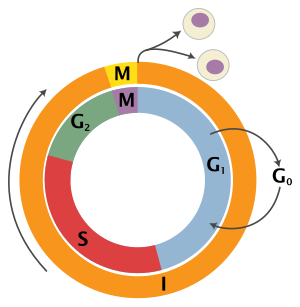The cell cycle or cell-division cycle is the series of events that take place in a cell leading to its division and duplication of its DNA (DNA replication) to produce two daughter cells. It makes Cell growth. (http://en.wikipedia.org/wiki/Cell_cycle)

G1 (presynthetic growth) -> S (DNA synthesis) -> G2 (premitotic growth) -> M (mitotic)
- G0 (quiescent/senescent)
- Interphase
- G1
- S
- G2
- Mitotic phase (Mitosis)
Each stage requires completion of the previous step, as well as activation of necessary factors; nonfidelity of DNA replication, or cofactor deficiency result in arrest at the various transition points.
The cell cyle is regulated by activators and inhibitors.
Cell cycle progression is driven by proteins called Cyclins - named for the cyclic nature of their production and degradation - and cyclin-associated enzymes called Cyclin-dependent kinases (CDKs).
CDKs acquire the ability to phosphorylate protein substrates (i.e., kinase activity) by forming compexes with the relevant cyclins.
Transiently increased synthesis of a particular cyclin leads to increased kinase activity of the appropriate CDK binding partner; as the CDK completes its round of phosphorylation, the associated cyclin is degraded and the CDK activity abates.
Thus, as cyclin levels rise and fall, the activity of associated CDKs likewise wax and wane.
More than 15 cyclins have been identified; cyclins D, E, A, and B appear sequentially during the cell cycle and bind to one or more CDKs.
관련정보
Table of Contents
Incoming Links #
Related Medical Scholarly Articles (MedicalScholarlyArticle 0) #
- Biomarkers in triple negative breast cancer: A review
- Comprehensive functional analysis of the tousled-like kinase 2 frequently amplified in aggressive luminal breast cancers
- Covalent modifications of histones during development and disease pathogenesis
- Is the future of personalized therapy in triple-negative breast cancer based on molecular subtype
- Patterns of somatic mutation in human cancer genomes
Related Articles (Article 1) #
Related Books (Book 2) #
Related Drugs (Drug 3) #
Suggested Pages #
- 0.146 Haploview
- 0.091 Polycomb regulates mesoderm cell fate-specification in embryonic stem cells through activation and repression mechanisms
- 0.072 PI3K-Akt signaling pathway
- 0.069 Metastasis
- 0.064 Cancer-specific defects in DNA repair pathways as targets for personalized therapeutic approaches
- 0.061 RAS
- 0.053 Induced pluripotent stem cell
- 0.053 Polycomb-group proteins
- 0.049 CDKN2A
- 0.036 mTOR
- More suggestions...